| All Artists: Wagner, Demesch, Ludwig, Solti, Vpo Title: Tannhauser Members Wishing: 0 Total Copies: 0 Label: Polygram Records Release Date: 10/25/1990 Genre: Classical Style: Opera & Classical Vocal Number of Discs: 3 SwapaCD Credits: 3 UPC: 028941458124 |
Search - Wagner, Demesch, Ludwig :: Tannhauser
 | Wagner, Demesch, Ludwig Tannhauser Genre: Classical
|
Larger Image |
CD DetailsSimilarly Requested CDs
|
CD ReviewsMagical Ted Zoldan | Los Angeles, CA, USA | 04/11/2005 (5 out of 5 stars) "I still can't listen to the Pilgrim's music from TANNHAUSER without hearing Elmer Fudd and Bugs Bunny sing along to it in the classic Cartoon "What's Opera, Doc?" It is only seldom that a recording lets me completely forget the Rabbit. This is one of them. The most prominent advantage of this set is the use of the "Paris" edition of the score, as opposed to the "Dresden" version, which does not include the apparition of Venus or the Funeral of Elisabeth at the end, which were added for Paris. (It does include a song for the minstral knight Walther von Vogelweide in the song contest) Secondly, the full score is performend, including the ENTIRE Venusberg ballet: all ten-plus minutes of it. The Cast is wonderful. Tannhauser has not been all that well served on record: Good performances for the most part, but there is no performance akin to Elisabeth Grummer's Elsa or Anja Silja's Senta: definitive performances. Rene Kollo is the closest we come to perfection. He is a controversial singer: his voice is not exactly of miraculous quality, and many despise his traversal of the role. I love it. He's no Domingo, who's Minstrel-Knight is ravishingly sung, but there is an intensity and dramatic depth to the Kollo's performance that Placido does not reach. The Rome Narration, as with many Tannhausers, is his best moment: all the agony and angst of the character come pouring out. It's both frightening and heartbreaking. There is beautiful singing in the duets with Venus and Elisabeth, and his blasphemous Hall Song is wonderful. The Two women in his life are also excellent. Helga Dernesh is heavier than the norm for Elisabeth, and has been bettered on record by Anja Silja, Elisabeth Grummer and, best of all, Lucia Popp. But her vocalism is ravishing: her greeting to the hall and the love duet with Kollo are genuine in their joy, and her appearance in act three is heartbreaking. She's no great shakes dramatically, but has enough talent to pull the role off, and she does it well. Christa Ludwig's Venus is the best on records: a seductive, warm tone combined with the mezzo's infallible dramatic ability. Her appearance in act three is so seductive I was ready to look for the Venusberg myself. Wolfram seems to get the short end of the stick in many of these reviews: the singers of this most important part are hardly mentioned. I intend to rectify that. Much has been said about the "beat" in Victor Braun's voice. I couldn't hear it at all. Sure, he's no Fischer-Dieskau or Watcher, but he has a sweet voice and has great sensitivity twords the meaning of the text. His ode to the Evening Star is wonderful. In the rather thankless role of the Landgraf, Hans Sotin has a resonate, authoritative sound. The Minstrel-Knights are excellent (they include a feature Wotan, Sachs and Dutchman for Solti: Norman Bailey) and the Biterolf of Manfred Jungwirth is strongly sung. The wonderful boy Soprano who sings the Shepard Boy is rudely uncredited. It took me a few hours of searching the internet to find out the singer's name is Johann Konigen. He has a beautiful voice. The Chorus work is wonderful, and the older Pilgrims are ravishingly sung by the Weiner Staatsoperchor. Presiding over it all is Sir Georg Solti, of course. Solti is Solti, rather bombastic, dramatic, not as subtle as other conducters such Karajan, Bohm, and Sawallich. This approch can be succesful enough with Verdi and Mozart, but when it comes to Wagner (and Strauss), he is nearly irreproachable. Here, he is still bombastic and direct, but he is more subtle than usual. He is, in fact, surprising in tune with the emotion of the score. The Majesty, the Mysticism, the love (and lust), the majesty: all the elements are brought to the listener's attention more subtlety than in the conductor's other Wagnerian recordings. The Weiner Philharmonker responds to his leadership to create one of the best played TANNHAUSERS on disk. In fact, it is the best performance of the work available. There are elements of other Tannhauser's you may want to experience: The Elisabeth of Popp and Silja, Fishcer-Dieskau or Eberhard Watcher's Wolfram, or the conducting of Wolgfang Sawallish, or even the Dresden version of the Opera, but if one can only have one TANNHAUSER, this is it." The Perfect Opera Recording? W. Pender | Cathedral City, CA United States | 11/19/2003 (5 out of 5 stars) "I've owned this recording since it came out on LP. Even then, I thought it a masterpiece. I've now added the new remastered edition to my collection and I'm bowled over by its beauty and it's engineering perfection. Listening through high-end headphones is like visiting the Venusburg live! You would never know this recording is 30+ years old. It could have been recorded last year, the engineering is so nearly perfect. In some passages, the sounds moves side to side to heighten the realism. I hear things I never heard before and I must rank this as one of the finest of classical recordings - opera or otherwise. If you're a Wagner follower, you must have this set at any cost." An excellent recording Ted Zoldan | 02/23/2000 (5 out of 5 stars) "Having listened to most of Sir Georg Solti's Wagner recordings, I must say this isn't quite a contender for his best. But, considering Solti's achievements in Wagner's operas have been magnificent, that doesn't mean this Tannhäuser is a bad recording at all; in fact, this is an excellent recording of Wagner's fifth opera. It was a great idea to use the Paris (1861) version, as opposed to the Dresden version of 1845. Some people have said that the Paris revisions (which include thesubstantial lengthening of the opening Venusberg scene) make the rest of the score pale in comparison, but I don't agree. I think Tannhäuser becomes a much better opera when the Paris version is used. The interesting note by the producer, Ray Minshull, explains the choices they used under the "umbrella-title" of Paris version, including the decision to use the continuous version of the Overture/Bacchanale. Solti's direction of the work is superbly inspired and wonderfully evocative, from the frenzied excitement of the Bacchanale to the majesty of the pilgrims' choruses. He has far and away my favorite Wagner conductor since I first heard his Ring Cycle, and this recording did nothing to change that view. The orchestra is the phenomenal Vienna Philharmonic. It is probably the greatest Wagner orchestra ever, and there is terrific work from both the Vienna State Opera and Vienna Boys' Choruses. The vocal performances are not quite as good, though. René Kollo in the title role is hardly ideal (though he was probably the best Heldentenor around when this recording was made in 1970). He gives a good interpretation of the part, but his rather dry, effortful singing subtracts from enjoyment. He is at his best in the quieter, lyrical portions of the score, but his shortcomings are highlighted next to the wonderfully creamy singing of Christa Ludwig. She IS Venus, in every way. End of discussion. Though I think Helga Dernesch isn't quite powerful enough for Isolde and Brünnhilde, her singing as Elisabeth is excellent. Her voice is just about perfect for the character: slightly steely, with a slight vibrato through her entire register, and her reading is heartfelt and sympathetic. Hans Sotin, near the beginning of his career, is in fantastic form as the Landgrave. His interpretation is superb and his voice is beautifully resonant, especially in lower registers. Victor Braun is an acceptable Wolfram, but his tight vibrato becomes somewhat annoying at the top of his range. The supporting cast is good to excellent, with an actual boy as the shepherd in Act I (though he is rather rudely not credited anywhere in the set). The minstrel/knights are particularly good. Overall, this an excellent recording of Tannhäuser, and one that I shall return to again and again."
|

 Track Listings (10) - Disc #1
Track Listings (10) - Disc #1







